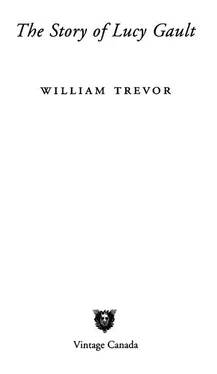Trevor, William - The Story of Lucy Gault
Здесь есть возможность читать онлайн «Trevor, William - The Story of Lucy Gault» весь текст электронной книги совершенно бесплатно (целиком полную версию без сокращений). В некоторых случаях можно слушать аудио, скачать через торрент в формате fb2 и присутствует краткое содержание. Год выпуска: 2002, ISBN: 2002, Издательство: Knopf Canada, Жанр: Старинная литература, на английском языке. Описание произведения, (предисловие) а так же отзывы посетителей доступны на портале библиотеки ЛибКат.
- Название:The Story of Lucy Gault
- Автор:
- Издательство:Knopf Canada
- Жанр:
- Год:2002
- ISBN:9780307366047
- Рейтинг книги:5 / 5. Голосов: 1
-
Избранное:Добавить в избранное
- Отзывы:
-
Ваша оценка:
- 100
- 1
- 2
- 3
- 4
- 5
The Story of Lucy Gault: краткое содержание, описание и аннотация
Предлагаем к чтению аннотацию, описание, краткое содержание или предисловие (зависит от того, что написал сам автор книги «The Story of Lucy Gault»). Если вы не нашли необходимую информацию о книге — напишите в комментариях, мы постараемся отыскать её.
The Story of Lucy Gault — читать онлайн бесплатно полную книгу (весь текст) целиком
Ниже представлен текст книги, разбитый по страницам. Система сохранения места последней прочитанной страницы, позволяет с удобством читать онлайн бесплатно книгу «The Story of Lucy Gault», без необходимости каждый раз заново искать на чём Вы остановились. Поставьте закладку, и сможете в любой момент перейти на страницу, на которой закончили чтение.
Интервал:
Закладка:
‘He’s t.t.,’ Henry said when he returned. ‘He wants lemonade.’ He rooted in one of the wall cupboards for lemonade crystals.
‘They’re old,’ Bridget said when he found a bottle in which there were some left.
‘They’ll do.’ Henry tipped what there was into a glass, which he filled up with cold water from the tap. It should be hot, Bridget said, in order to dissolve the crystals.
‘But Mother of God,’ she suddenly cried out, ‘what are we thinking of to be giving the man lemonade?’
*
‘I’m afraid you’ve upset my daughter,’ the Captain said in the drawing-room. ‘To tell you the truth I still didn’t know who you were when I brought you in from the hall.’
‘These times I’ve no employment, sir. The day you were out on the promenade with Mr Sullivan, sir, I was after finishing at the Camp.’
‘You were a soldier?’
‘I had no employment the day I seen you, sir. I got employment with Ned Whelan since. He took me on with him on account I would have experience with laying roads up at the Camp.’
Henry came with the lemonade, but it seemed to the Captain that it was not required after all. The loquaciousness of the man who’d been wandering about in the hall ceased abruptly. He shrank back into his chair when Henry approached him. Not knowing what to do, Henry put the glass of lemonade on the floor.
‘We’re in the kitchen, if you’d pull the bell again,’ he said before he went. He had taken his hat off. He glanced back apprehensively before he closed the door.
‘Who’s that man, sir?’
‘Henry works for us.’
‘I’m careful with a stranger, sir.’
‘Mr Horahan, why have you come out here?’
‘Ned Whelan let me go two days back, sir. What I’m telling you is in case you wouldn’t know it, sir. How it is with me, sir.’
The Captain drank the cup of tea he had poured for himself. Then he said he was at a loss.
His visitor was welcome, he added; bygones were bygones, he repeated; in no way did he wish to be inhospitable. All the same he was at a loss.
‘Time has settled our hash for us, Mr Horahan. But for all that it might have been better if you hadn’t come out here again.’
It occurred to him as he spoke that the man had come looking for work, since he had said he was unemployed. It was extraordinary that he might have, that having once attempted to burn the house down he should now return with such an end in mind. It seemed impossible, but even so the Captain said:
‘I’m afraid we’ve nothing to offer you here. If you were thinking of work.’
There was no response to this, neither a denial nor otherwise. Nothing was said for several minutes, and then the visitor said:
‘The three of us was smoking butts down at the bandstand and I said why wouldn’t we fix them? It was myself says it and the next thing is aren’t we asking Mr Fehilly would he give us advice.’
‘All that’s a long time ago.’
‘“Dose the dogs,” he says. “The first thing you’ll do is dose the dogs.” Mr Fehilly has the dose put by. He’ll have the bicycles got for us, is what he says. “Get the lie of the land,” he says. “Don’t set a foot in till it’s dark.” Mr Fehilly was a cripple for Ireland, sir. He had broken bones in his back. He had two fingers gone off of his hand. “Wait till we see what have we in the petrol line,” he says, and the tins were out the back, down a drain that’d gone dry. “Cover anything you’d have over,” he gives us the instruction again. He has an old waterproof to obscure the tins when they’d be secured to the cross-bars. “Don’t call in anywhere, take care if you’ll stop for a smoke.” You’d repeat the whole thing back until you’d say it right. Smash a pane, reach in for the catch. Raise up the sash, pitch in the juice. Pitch it in on the curtains. Pitch it in on any cushions would be lying around so’s you’d get the feathers to go up. Pull the bell chain, rouse up the house. Wait for a lamp to be lit upstairs before you’d strike the match. Bring back the matchbox. Don’t leave the matchbox lying around.’
‘Drink up your lemonade, Mr Horahan, like a good man. All this is better left.’
The Captain stood up.
‘There’s things wouldn’t be known to you, sir,’ his visitor said.
‘Well, yes, there would be, but all the same maybe they’re better left.’
‘There was a Brother used say to us the big house is the enemy. Did you hear tell of the Whiteboys, sir?’
‘Oh, indeed.’
‘Then again, the Ribbonboys. Then again, the hedge schools. That Brother would lay it out for us. How the Whiteboy would take a name for himself – Slasher or Cropper, Fearnot, Burnstack, anything he’d like. How the name would pass on when one boy’d be finished with it. I was a good few years at the Camp, sir.’
‘I see.’
‘I signed up in the army on account of the way I was with the dreams I’d have.’
‘Ah.’
‘I was never settled at the Camp. I was never settled since, sir, although it was quiet with me one time. The only commotion there’d be at the railway station was when the Cork train would be late with the August outing on it. Mr Hoyne would have his pictures made on the sand and the colours would get washed off by the sea before the August children would see them. The same month of the year, the Pierrots had a wicker basket with a lid hinged on to it and I’d wheel it on the trolley up the platform for them and they’d give me a few coppers. Another time again it was the Boys’ Brigade parading down the platform and I’d stand there watching and nobody’d mind. Only a half-dozen of the boys there’d be, with their little drummer caps on. I never saw a cap the like of it since, sir. Is it gone altogether?’
‘Maybe it is.’
‘I was grand at the railway station the first while, sir. I was going out with a girl and we used walk down to where the swans would be. There was a little white dog would come running out of the hut where you’d buy cigarettes and he’d be snapping at her heels and she’d scold him like he was an infant. “Wait till you’ll see this,” I says to her and I showed her the shoulder. Doing the big fellow, the way you would with a girl you’d be gone on. Oh, I was gone on her all right. “Where’d you get that?” she says, and when I told her she says she didn’t know I was one of the lads going out on that game. To tell the truth of it, you could hardly see the old scar, but however it was the next thing is I was never walking by the swans with her after. I’d look out for her and she wouldn’t be around. If I’d locate her at Mass she’d scuttle off from me.’
‘Oh. I’m sorry.’
‘I didn’t get the truth of it until the dreams. I knew the truth of it then, sir. I was never easy since. I’d be frightened of the dreams, sir.’
The Captain wondered if this man had come to the house before, if during the years of his own absence he had ever been a visitor. If this was so, it had never been mentioned, and for a moment he wondered if it had been kept from him, or not spoken of, as sometimes the activities of the disturbed were not. But neither his daughter’s manner while she had been in the room, nor Henry’s, suggested that any of this was likely.
The ex-soldier’s awkward occupation of the armchair he had hunched himself into was confirmation of the unease he referred to. From time to time, while silences gathered or his fragmentary talk continued, his hands touched his clothes in different places, appearing to search for something. Abruptly, they would become still and then the knuckles of one were again rubbed by the fingers and palm of the other. His eyes squinted perpetually to the floor, to the rugs that covered most of the wide floorboards, to the corners of the wainscoting.
Читать дальшеИнтервал:
Закладка:
Похожие книги на «The Story of Lucy Gault»
Представляем Вашему вниманию похожие книги на «The Story of Lucy Gault» списком для выбора. Мы отобрали схожую по названию и смыслу литературу в надежде предоставить читателям больше вариантов отыскать новые, интересные, ещё непрочитанные произведения.
Обсуждение, отзывы о книге «The Story of Lucy Gault» и просто собственные мнения читателей. Оставьте ваши комментарии, напишите, что Вы думаете о произведении, его смысле или главных героях. Укажите что конкретно понравилось, а что нет, и почему Вы так считаете.











